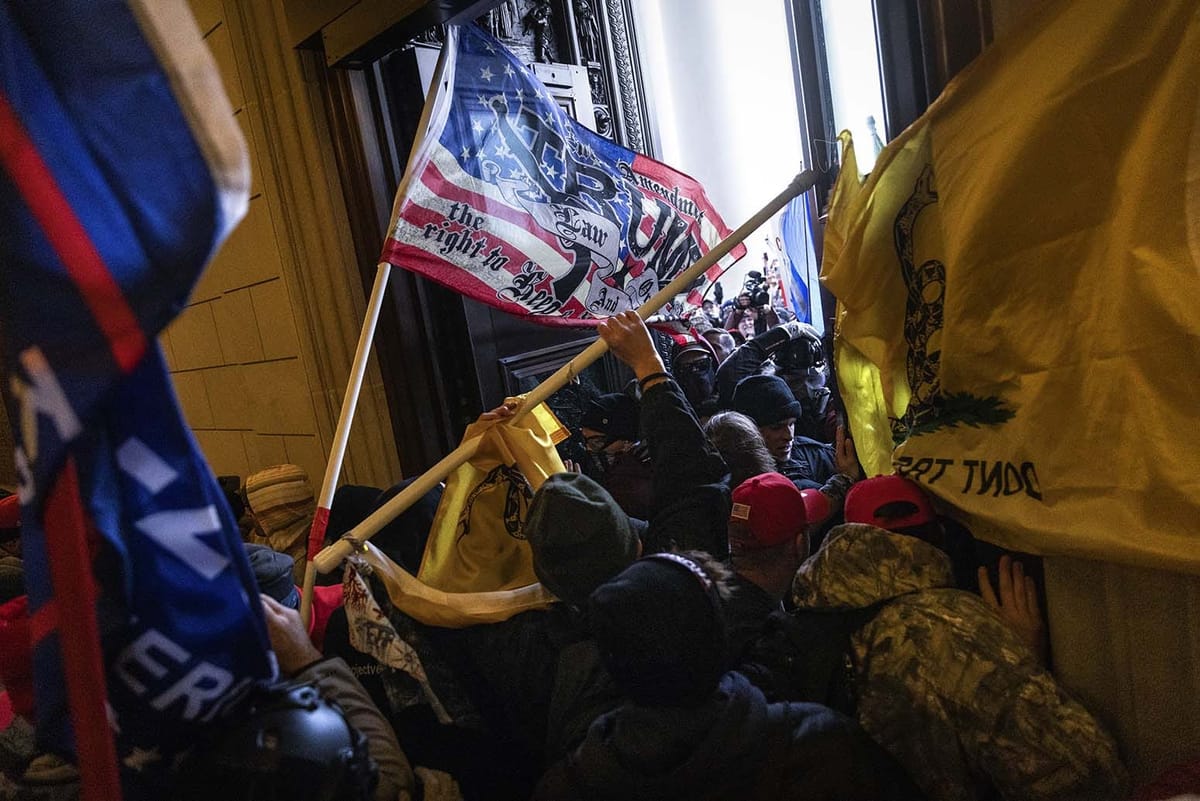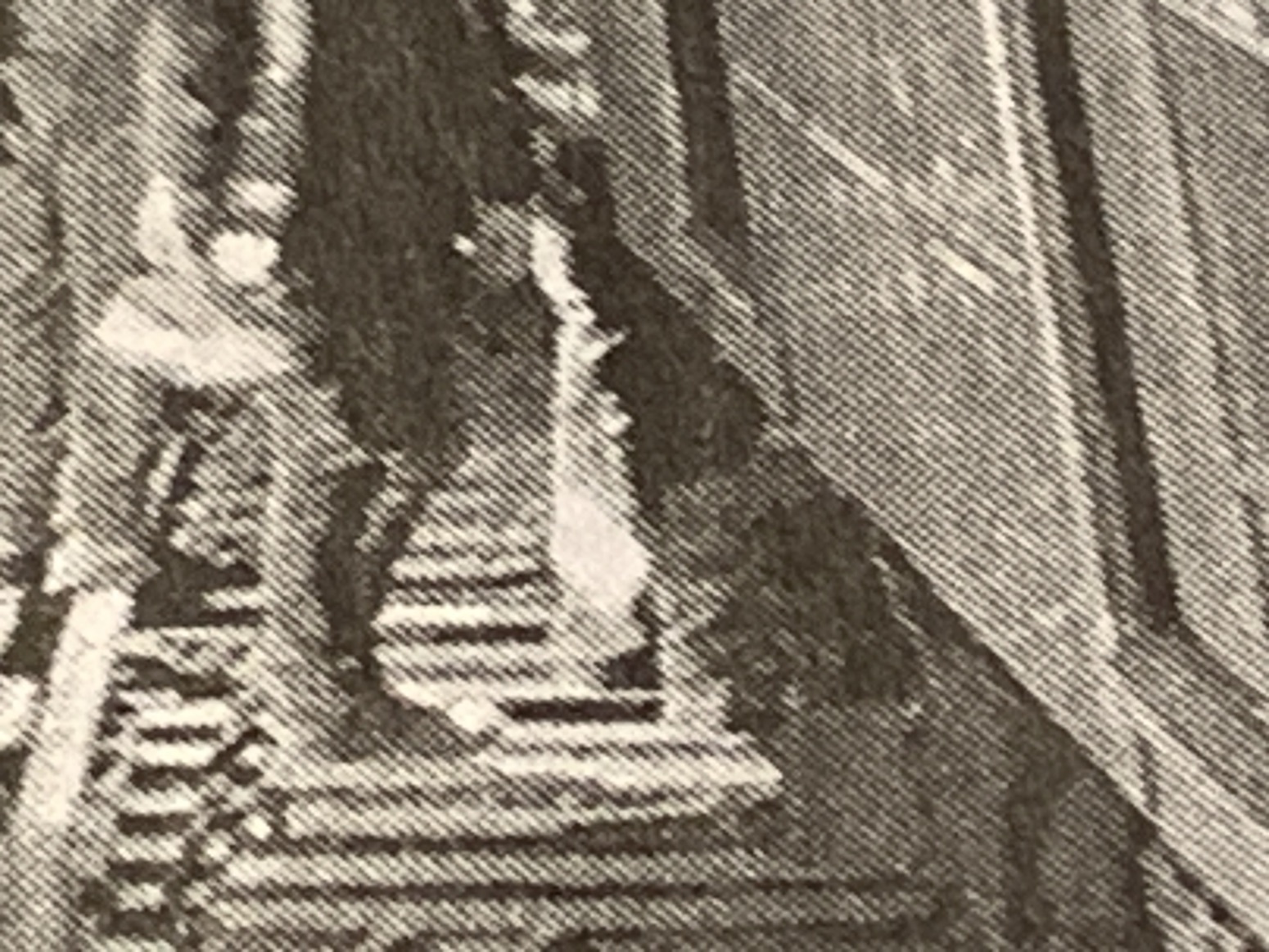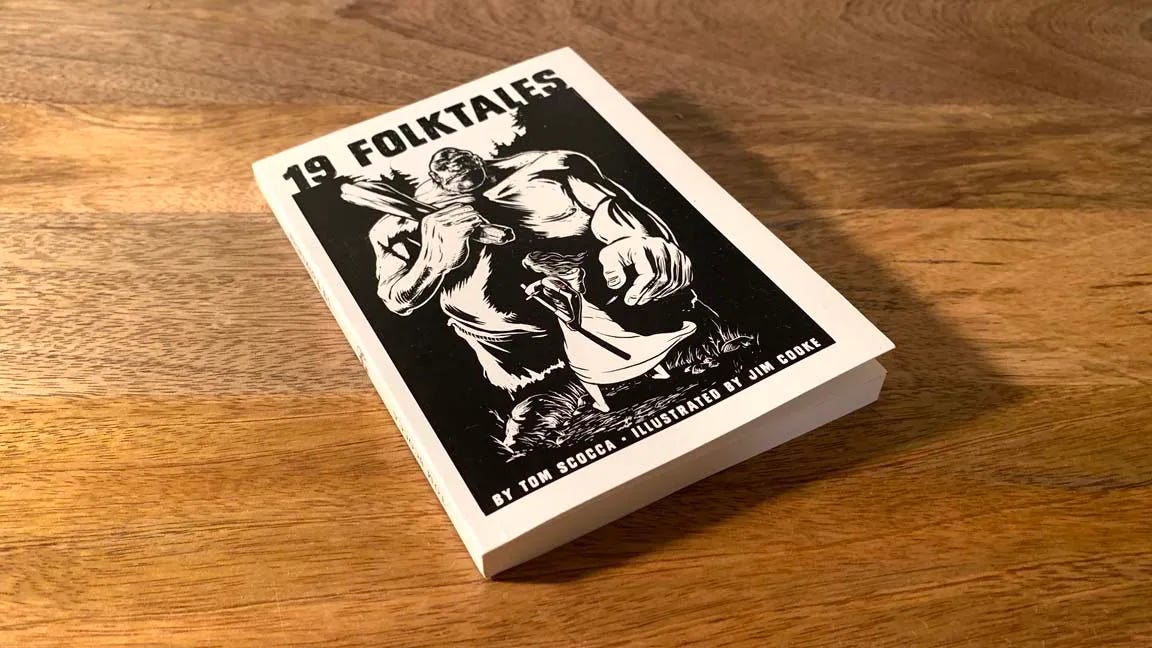THE WORST THING WE READ™: Overthrowing the Insurrection Clause
INDIGNITY VOL. 4, NO. 3

THE WORST THING WE READ™
Why Pretend Not to Know What Happened on January 6?
THREE YEARS AGO, the then-president of the United States, angry about having lost his bid for reelection, tried to overthrow the government. It's not a complicated fact, but it's an unpleasant fact to think about—made more unpleasant because the same person is running for president again, and is not only the overwhelming favorite to be his party's nominee, but is polling competitively for the general election.
Our constitution, for all its defects, did try to anticipate this situation, in the Fourteenth Amendment, which includes a clause barring people who have engaged in insurrection from holding federal office. When the amendment was ratified, the country was specifically concerned with keeping power out of the hands of people who might still be loyal to the defeated Confederate States of America.
Once the Confederate problem had been dealt with—first through exclusion and then through Congressional amnesty, both under the terms of the Insurrection Clause—most people, especially the people who write about United States politics and constitutional law, spent the next century and a quarter ignoring that part of the amendment. No national political figures were really engaging in insurrection against the United States, so it seemed moot and forgettable.
But then Donald Trump went ahead and engaged in an insurrection. It was obvious at the time exactly what he was doing—sending a violent mob to the Capitol to halt the peaceful transition of power, with the aim of claiming a fraudulent victory—and since then, further investigation has revealed how fully planned and premeditated the whole thing was. Under the plain terms of the constitution, he made himself ineligible to be president.
Unfortunately, nobody really did anything about it at the time. Senate Republicans, offered the chance to perpetually disqualify Trump by finding him guilty in his second impeachment trial, refused, with their leader, Mitch McConnell, pleading that he didn't have the power to convict a president who had already left office. Congress took no measures to expel Trump's co-conspirators from its own ranks, and they now make up the controlling faction of the ruling majority in the House of Representatives. And Trump is on the 2024 campaign trail.
Yet the Fourteenth Amendment was still there, and it said what it said, even if most people were trying to pretend it didn't. Many mainstream political opinion-writers and establishment law professors have reacted to this awkward circumstance by urging everyone to keep on pretending. The politics opinionators have offered half-baked excuses about the law ("['Insurrection'] is a defensible shorthand for January 6, one I’ve used frequently myself," Jonathan Chait wrote for New York magazine, "But it’s not the most precise term"); the legal experts have made feeble political claims ("[W]hat actually happened on Jan. 6—and especially Mr. Trump’s exact role beyond months of election denial and entreaties to government officials to side with him—is still too broadly contested," Yale Law professor Samuel Moyn wrote for the New York Times).
Who cares if some people—operating under the shelter created by the lack of real consequences for Trump—have spent the last three years trying to undermine the obvious consensus understanding of what happened on January 6? That just illustrates the truth that the system will not be stabilized by acting as no one ever destabilized it. Trump did what he did. People died in and around the Capitol; Congress stopped trying to certify the presidential vote and fled its chambers; the military turned its command over to the Speaker of the House. For more than half a day—and, effectively, all the way through the rest of the lame-duck period—the constitutional operations of the government were suspended.
To dodge the question of Trump's eligibility is to take a side on it, hoping to grant him immunity by default. But there is no stable status quo around failing to apply the Insurrection Clause anymore. The Colorado Supreme Court and the Maine secretary of state, asked to decide whether the 14th Amendment applies to Trump, concluded that they did have a duty to remove him from the Republican primary ballot. The Michigan Supreme Court ruled that it was someone else's job to decide. On Friday, the Supreme Court agreed to hear an appeal of the Colorado case.
The events of January 6 will be reckoned with, one way or another, no matter how fervently the legal experts may wish they wouldn't. The day before the Supreme Court took up the case, Yale Law professor Jed Rubenfeld wrote in the Wall Street Journal's opinion section to warn against letting judges "make up rules to decide which presidential candidates can run":
The Colorado Supreme Court didn’t exactly get the law wrong when it ordered election officials to strike Donald Trump from the ballot. The problem is there was no law to get right.
Almost no case law exists on Section 3 of the 14th Amendment. On a clean judicial slate, judges are asked to decide whether the provision applies to the presidency, who has standing to sue, what counts as “engaging” in an insurrection, what kind of process is due and, most important, what counts as an “insurrection” in the first place. The Colorado justices themselves described the case as “uncharted.”
Rubenfeld's proposed solution to this purported problem was to have the Supreme Court declare that Insurrection Clause cases need to "be decided under a pre-established set of rules." But there is an established set of rules. It says insurrectionists can't hold office. To turn what Trump did on January 6 into a blank-slate question required frantic scrubbing on Rubenfeld's part:
We don’t know if Mr. Trump engaged in constitutional wrongdoing. We don’t even know if, legally speaking, what he did was unprecedented...
If the Jan. 6 riot was an “insurrection,” what about the 2020 Black Lives Matter riots? In the middle of those riots, Rep. Ayanna Pressley said: “There needs to be unrest in the streets.” Sen. Kamala Harris said: “Everyone beware, because they’re not gonna stop. They’re not gonna stop before Election Day in November, and they’re not gonna stop after Election Day . . . and they should not. And we should not.” Rep. Maxine Waters even called the 1992 Los Angeles riots an “insurrection” as she egged them on.
None of those concerns were particularly challenging or unanswerable. Maxine Waters, for instance, was not president of the United States in 1992, and she did not invite the rioters to come to town and overturn an election result. Donald Trump was president on January 6, 2021, and he did.
That doesn't mean he will be held accountable for what he did. The Trump presidency already provided a long, humiliating lesson in how little power the constitution has over someone who wants to ignore it. The impeachment process turned out to be useless against a chief executive and a political party who didn't care about disgrace. The Emoluments Clause was no barrier at all to a president pocketing millions and millions of dollars in payouts from foreign powers.
It is more than possible that the Supreme Court—including one justice whose wife actively participated in Trump's effort to illegally seize power—will treat the Insurrection Clause as one more unenforceable rule. It may well be that our system provides no way to stop someone who tried to violently steal an election from trying again. Better to find out for certain than to concede defeat on the point and go on proclaiming, against the evidence, that the system works.

WEATHER REVIEWS

New York City, January 4, 2024
★★★★ The possible snow showers in the forecast had drifted off somewhere else on the morning radar, but outdoors was still true wintry gray, not the soggy tropical gray of December. The cold was true wintry cold; stepping into the heated bank lobby brought on the long-absent feeling of relief at getting in out of it. Over Union Square, the clouds thinned and seams appeared between them. Back uptown, the gray had held or returned, but before long the sky there was showing blue. Rooftop exhaust pipes gleamed in the strengthening sun.

EASY LISTENING DEP’T.
INDIGNITY MORNING PODCAST
Indignity Morning Podcast No. 192: A big jolt.
Tom Scocca • Jan 5, 2024


BLUESKY DEPARTMENT
READERS OF INDIGNITY who have previously benefited from the Bluesky-code generosity of other readers of Indignity are now paying it forward by providing us with even more codes for the still-beta social network. If you haven’t already gotten a code from us, we have lots of codes. Email indignity@indignity.net and we will award Bluesky codes to those who respond, one per reader, first email, first served.

SANDWICH RECIPES DEP’T.
WE PRESENT INSTRUCTIONS for the assembly of sandwiches from Reliable Recipes, by The Ladies' Aid Society of the Methodist Episcopal Church, Grundy Center, Iowa. Published in 1928, now certified Public Domain Mark 1.0 Universal, these recipes and more are available at archive.org for the delectation of all.
SALMON
Use flaked salmon, mixed with finely chopped pickles, seasoned with salt and pepper. Bind with mayonnaise and spread between slices of buttered bread.
CHEESE FILLING
Heat a small can (6 ounces) of evaporated milk in a double boiler. Add a four ounce package of Phenix American cheese cut into small pieces. Stir occasionally until cheese is melted and smooth. Cool slightly before spreading. This amount makes a dozen and a half large sandwiches.
—Mrs. Howard Nickerson.
PIMENTO CHEESE
1/2 cup yellow cream cheese
3 tablespoons pimentoes
1/8 teaspoon salt
3 tablespoons salad dressing
Finely chop the pimentoes. Put cheese through the food chopper. Mix all the ingredients together and spread on well buttered slices of bread.
—Mrs. D. R. Earl.
TOASTED CHEESE
36 slices white bread
1 cup soft butter
1 cup white or yellow cream cheese
1/4 teaspoon salt
4 tablespoons salad dressing
Mix butter and cheese together until very soft and creamy. Add remaining ingredients and spread between slices of bread. Remove crusts and cut each sandwich into 3 bars. Toast a delicate brown on both sides. Wrap in a cloth and keep warm in the oven until all sandwiches have been toasted. Serve hot.
—Mrs. Byron Hawn.
If you decide to prepare and attempt to enjoy a sandwich inspired by this offering, be sure to send a picture to indignity@indignity.net.

MARKETING DEP'T.

The second printing of 19 FOLK TALES is now available for belated Holiday gift-giving and personal perusal! Huddle up against the cold with a cozy collection of stories, each of which is concise enough to read within the snowy part of a wintry-mix storm.

HMM WEEKLY MINI-ZINE, Subject: GAME SHOW, Joe MacLeod’s account of his Total Experience of a Journey Into Television, expanded from the original published account found here at Hmm Daily. The special MINI ZINE features other viewpoints related to an appearance on, at, and inside the teevee game show Who Wants to Be A Millionaire, available for purchase at SHOPULA.

FLAMING HYDRA will launch in January of 2024. The FLAMING HYDRA Holiday Preview Spectacular, a rich sampling of the writing and art you’ll enjoy as a subscriber to the forthcoming daily newsletter, is available now for your inspection. FLAMING HYDRA is the work of 60 world-class talents, but that’s just one reason to subscribe. FLAMING HYDRA is a 100% cooperatively owned, ad-free publication with no owners and no investors; just a bunch of writers and artists working together and splitting the proceeds equally.

INDIGNITY is a general-interest publication for a discerning and self-selected audience. We appreciate and depend on your support!






